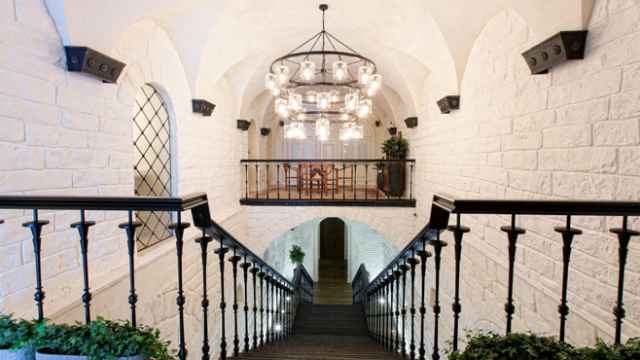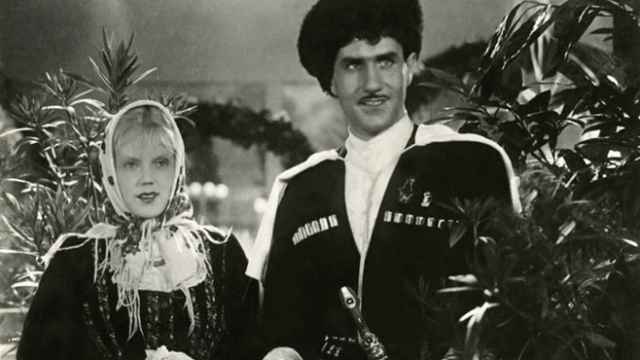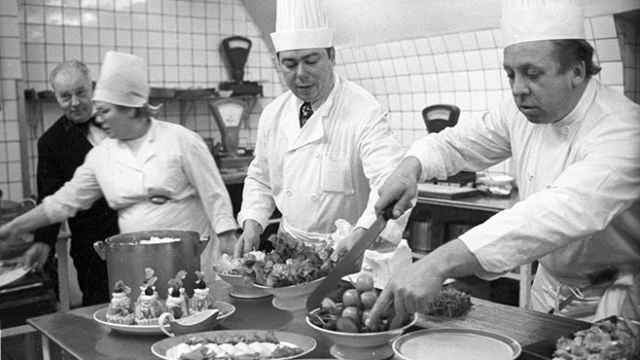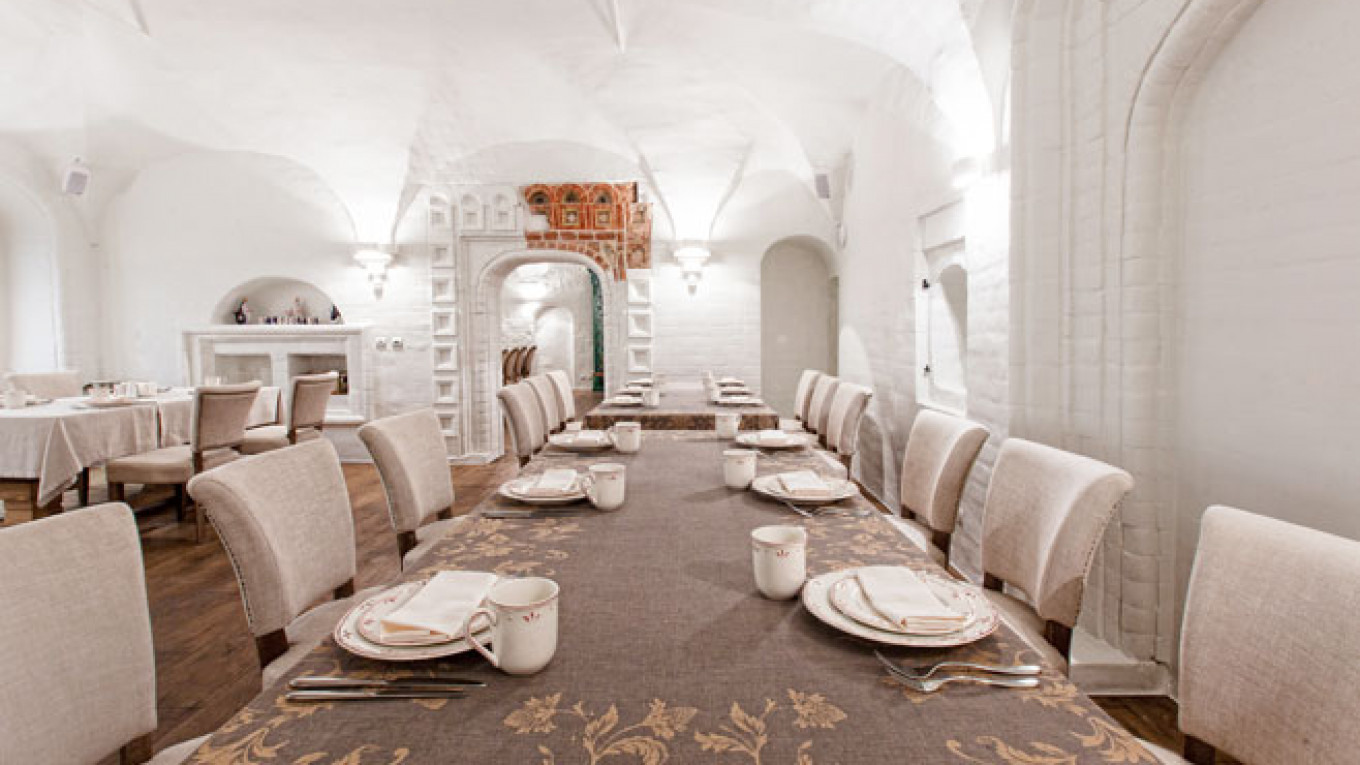For more than a decade, the picture windows at No. 6/2 Tverskaya Ulitsa were covered by plastic construction sheets. It was hard to believe that behind those windows was once a culinary heaven for the most refined gourmets among the Moscow elite, from television stars and cosmonauts to Politburo members and the intelligentsia. In the late 1940s, the head of the NKVD — the predecessor of the KGB — Lavrenty Beria and Stalin's son Vasily used to stop in to drink a glass of Kakheti wine. In the mid-1970s singer-songwriter Vladimir Vysotsky and "Solaris" director Andrei Tarkovsky would come here to argue about art and life over dinner. John Steinbeck wrote about it and Richard Burton stopped in for a bite. After being closed for major reconstruction for over a decade, this historical treasure — the only Georgian restaurant in Soviet Moscow — is once again open for diners, within the same walls, and with the same name: Aragvi.

Forward to the Past
"That's the balcony where Beria walked," said the restaurant's pubic relations director Artur Gevorkyan, pointing to one of the spacious halls decorated with Soviet-style paintings. "The interior isn't like in Beria's days," he said. The restaurant has nine dining areas, each with unique ambience but none that fully reproduce its Soviet predecessor. "One of the rare authentic things in the new Aragvi that came from the old one is the wall mirror," Gevorkyan said, pointing to a worn antique mirror with black scratches on its silver surface.
Everything is so fresh that even the oldest elements of the interior — brick arches from the 17th century that were discovered during reconstruction — look more like a modern stylization than a real antiquity. "It was a huge surprise. Nobody suspected that we would discover such ancient architecture under layers of the 1930s," Aragvi's manager Elvira Mandrovskaya said. "But once we found it, we had to clear every aspect of our reconstruction work with the Moscow authorities. That's why it took us over seven years to do the work."
The restaurateurs left some fragments of the ancient brick masonry without plaster, and now diners can sit back to experience the era of the boyars in medieval Muscovy — at least visually. But most people will come here for the flavors of the Caucasus. "And don't forget the cuisine of the entire Black Sea region," Aragvi's head chef Alexei Zenin said.
Zenin, who developed the menu with brand chef Anton Sarkisov, said that his main goal was to avoid extremes. "The worst thing we could do would be to tinker with chakhokhbili — a spicy chicken stew with fresh herbs — to make it molecular, or to serve our khinkali — dumplings filled with succulent spiced minced meat — in a flower pot," Zenin said. "Instead of playing with the food, we are trying to reveal all its authentic flavors."
But that doesn't mean going back to Aragvi's Soviet roots, Zenin stressed. "There were no attempts to copy, dish by dish, the menu of the old restaurant. People have changed and tastes have changed," Zenin said.

A scene from Pyryev's film, "The Pig-Tender and Shepherd," filmed at the Aragvi in 1941 — one of many movies filmed here over the decades.
Food to Faint Over
"You can't compare today's dining scene in Moscow with the Soviet one," said poet Lev Rubinshtein, who used to go to the old Aragvi in the 1970s. "How many places could you get food from the Caucasus in the capital? Just a few places serving shashlik (grilled meat). Aragvi, with its 12-page menu, had no rival."
Another eyewitness to history was overwhelmed by the authentic cuisine. "I was really shocked when I saw the dishes that you could order there," said Sergei Solovyov, a film director known for "Assa" and "Anna Karenina." "I can see it as if it were yesterday. They brought our order of lobio, satsivi, shashlik, chicken livers, and caviar to the table … but I was so hungry that I fainted before the waiter brought our plates."

Chef Gudkov in the center, working in the kitchen in 1977. A special train brought vegetables, fruit, spices and meat from Georgia to serve in a city where good food was getting harder to find.
Challenging Present
The new Aragvi faces some challenges, and the most difficult of all is that Muscovites won't faint when they see a table of Georgian food. Today Moscow diners can tell good Georgian food from bad. At Aragvi, it's truly good: The lobio is certainly perfect, as are the khinkali — dense dough that holds the spicy broth released by the coarsely minced beef or lamb fillings as they cook. The pkhali, another classic Georgian dish, is made of beans, spinach or beets mixed with nuts and herbs. The Aragvi's rich mix of flavors and textures is ideal — fresh as spring but rich with nut oil. The soups are also beautifully prepared, but be sure to save room for their grilled dishes: lyulya kebab — spiced minced meat — juicy chunks of meat on skewers and lamb ribs.
The food and atmosphere of the new Aragvi might be wonderful, but the old mirror on the wall will never reflect the same level of pure joy and satisfaction as it did when Vysotsky and Tarkovsky sat here and argued about art and life.
+7 (495) 745 1939
aragvi.moscow
6/2 Tverskaya Ulitsa. Metro Okhotny Ryad, Pushkinskaya
Contact the author at artsreporter@imedia.ru
A Message from The Moscow Times:
Dear readers,
We are facing unprecedented challenges. Russia's Prosecutor General's Office has designated The Moscow Times as an "undesirable" organization, criminalizing our work and putting our staff at risk of prosecution. This follows our earlier unjust labeling as a "foreign agent."
These actions are direct attempts to silence independent journalism in Russia. The authorities claim our work "discredits the decisions of the Russian leadership." We see things differently: we strive to provide accurate, unbiased reporting on Russia.
We, the journalists of The Moscow Times, refuse to be silenced. But to continue our work, we need your help.
Your support, no matter how small, makes a world of difference. If you can, please support us monthly starting from just $2. It's quick to set up, and every contribution makes a significant impact.
By supporting The Moscow Times, you're defending open, independent journalism in the face of repression. Thank you for standing with us.
Remind me later.


